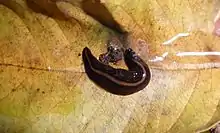Paraba
Paraba is a genus of land planarians from South America.
| Paraba | |
|---|---|
 | |
| Paraba multicolor | |
| Scientific classification | |
| Kingdom: | |
| Phylum: | |
| Class: | |
| Order: | |
| Suborder: | |
| Family: | |
| Subfamily: | |
| Genus: | Paraba Carbayo et al., 2013 |
| Type species | |
| Geoplana multicolor Graff, 1899 | |
Description
Species of the genus Paraba have a slender body with nearly parallel margins while creeping. The largest specimens may reach about 8 cm in length. The copulatory apparatus has a permanent conical penis occupying the entire male cavity and the female cavity is rounded and filled with a multilayered epithelium.[1]
Etymology
Paraba means multicolored in the Tupi language and alludes to the name of the type-species, Paraba multicolor.
Species
There are 14 species assigned to the genus Paraba:
- Paraba caapora (Froehlich, 1958)
- Paraba cassula (E. M. Froehlich, 1955)
- Paraba franciscana (Leal-Zanchet & Carbayo, 2001)
- Paraba gaucha (Froehlich, 1959)
- Paraba goettei (Schirch, 1929)
- Paraba incognita (Riester, 1938)
- Paraba multicolor (Graff, 1899)
- Paraba phocaica (Marcus, 1951)
- Paraba piriana (Almeida & Carbayo, 2012)
- Paraba preta (Riester, 1938)
- Paraba tingauna (Almeida & Carbayo, 2012)
- Paraba rubidolineata (Baptista & Leal-Zanchet, 2005)
- Paraba suva (Froehlich, 1959)
- Paraba tapira (Froehlich, 1958)
References
- Carbayo, F.; Álvarez-Presas, M.; Olivares, C. U. T.; Marques, F. P. L.; Froehlich, E. X. M.; Riutort, M. (2013). "Molecular phylogeny of Geoplaninae (Platyhelminthes) challenges current classification: Proposal of taxonomic actions". Zoologica Scripta. 42 (5): 508. doi:10.1111/zsc.12019.
This article is issued from Wikipedia. The text is licensed under Creative Commons - Attribution - Sharealike. Additional terms may apply for the media files.